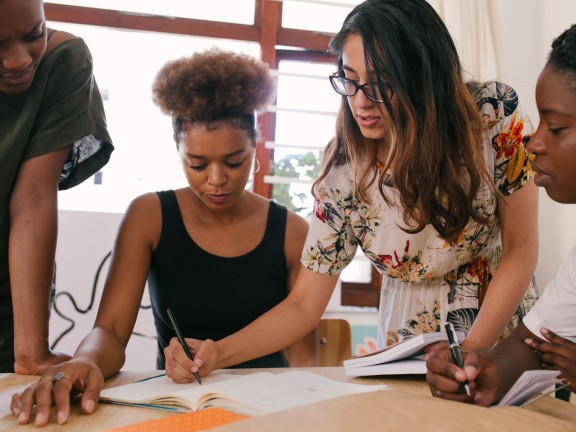What is the Innovation Lab Learning Collaborative? A Q&A with HealthSpark’s consulting partner Meghan McVety

As part of our work to create systemic change within the safety net system, HealthSpark recognizes that our role as a philanthropy must shift, too. Part of that shift includes embracing a culture and practice of trust-based philanthropy, which centers on philanthropies sharing and redistributing power to community partners, cultivating meaningful relationships built on trust, and embracing continuous learning, among others.
One example of how we're putting these practices into action is through our Learning Collaborative, a component of our grantmaking program the Innovation Lab. The Learning Collaborative is structured as three to four facilitated sessions where all lead grantees and their partner organizations are able to share updates on their projects, discuss key challenges and successes relevant to systems change work across sectors, and share insights. Since the Learning Collaborative isn't a common practice among local philanthropies, we're taking some time in this post to explore the concept behind the Learning Collaborative, why it is critical to supporting a broader culture of systems change within the safety net system, and what grantee partners can expect when they attend.
To explore these questions we sat down (virtually) with Meghan McVety of Capacity for Change, LLC, HealthSpark's longtime consultant to the Safety Net Resiliency Initiative and the facilitator for the Learning Collaborative, for a quick Q and A.
HealthSpark: How does the Learning Collaborative support Innovation Lab project partners?
Meghan McVety: The Learning Collaborative (LC) provides a space for networking and reflection. Participants connect with each other and have the opportunity to see their work with a view of the broader safety net in Montgomery County. We hope the experience gives them ideas for their work, and they also give HealthSpark ideas about how it can best support organizations and the safety net in general.
HealthSpark: What can grant partners expect during the LC? How can they make the most of the time spent?
MM: The LC, by design, is a âlow impact exercise.' Participants don't need to prepare for the sessions and they are structured to facilitate relatively informal conversations. For now, the sessions are virtual, and just like in-person sessions, participants will get the most out of it by engaging in deep listening, sharing their experiences, and making the effort to meet new people. We have found that people are candid about what is working and what isn't working, and that benefits everyone.
HealthSpark: What key questions have emerged, and what are we learning about those questions?
MM: The key questions affirm the guiding questions behind the Safety Net Resiliency Initiative: What can we do differently to achieve better outcomes for our communities and our organizations? Safety net organizations do incredible work with scarce resources and support - what might the safety net look like if it had more resources and support, and if fewer people needed services? This requires us to continually reflect on the disparities and structures that create the need for the safety net, and to work on changing systems at a high level.
A major lesson is that there is a hearty appetite for talking about these big questions, and at the same time, it can be scary or even frustrating to engage in these conversations as service providers are working so hard every day just to meet basic needs and protect the dignity of the people they serve. There is an inherent tension in sustaining services while re-thinking them altogether.
HealthSpark: How is the information gained during the LC used to inform other strategies in the Safety Net Resiliency Initiative- such as advocacy, narrative change, systems leadership capacity building, and our communities of practice?
MM: HealthSpark applies what it learns in every strategy: what grants make sense and how to make them, what to lift up in our communications, where the gaps are in knowledge or resources that we might be able to fill, and how HealthSpark can be a better partner overall. We are not afraid of making mistakes, as long as we learn from them, and we encourage this approach among our partners. We have limited resources so we try to be catalytic in everything we do - to spark change beyond our grant dollars - and the LC helps us to identify areas and strategies where we can be a catalyst for change.
HealthSpark: Anything else grant partners should understand before starting the Learning Collaborative?
MM: We are grateful that our partners come into the LC trusting that it will be a place of collaboration, learning, and true partnership. It is humbling to be in the presence of people who dedicate their lives to others, and who show-up to be supportive of others who are doing the same.
The Innovation Lab is currently accepting grant applications through November 1, 2021. Learn more and apply. Learn about funded projects here.